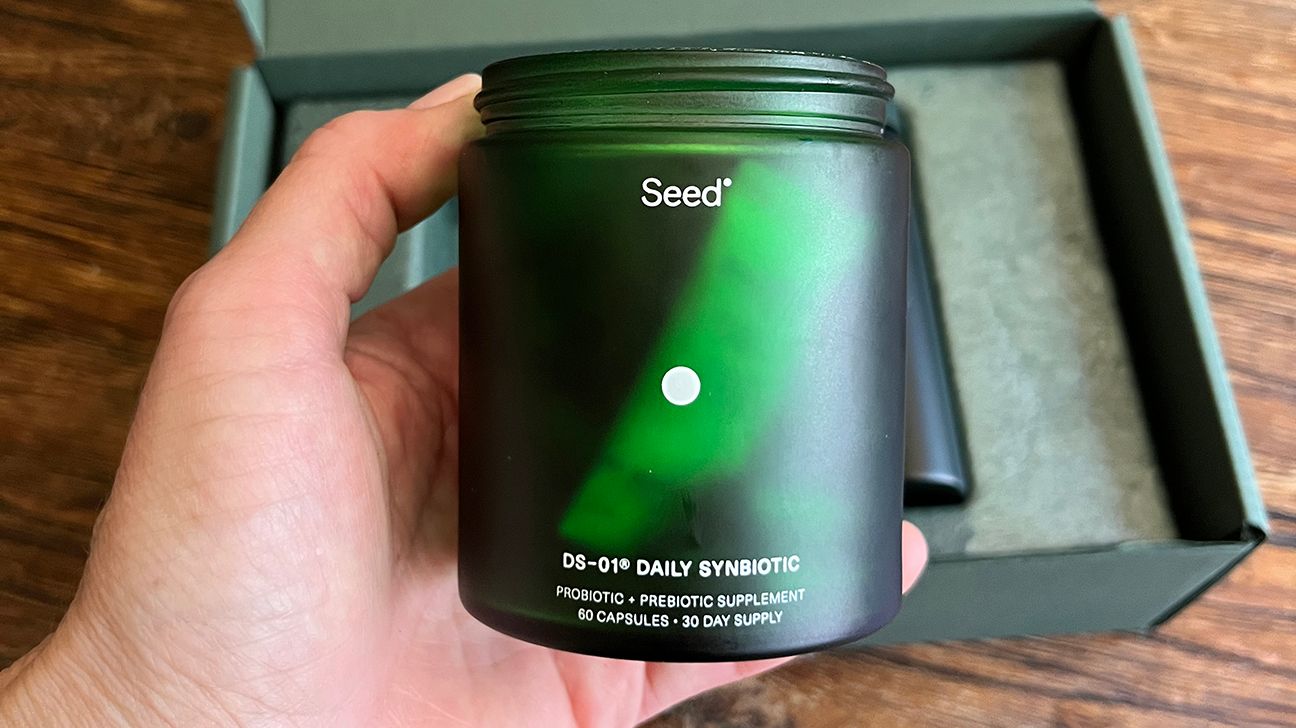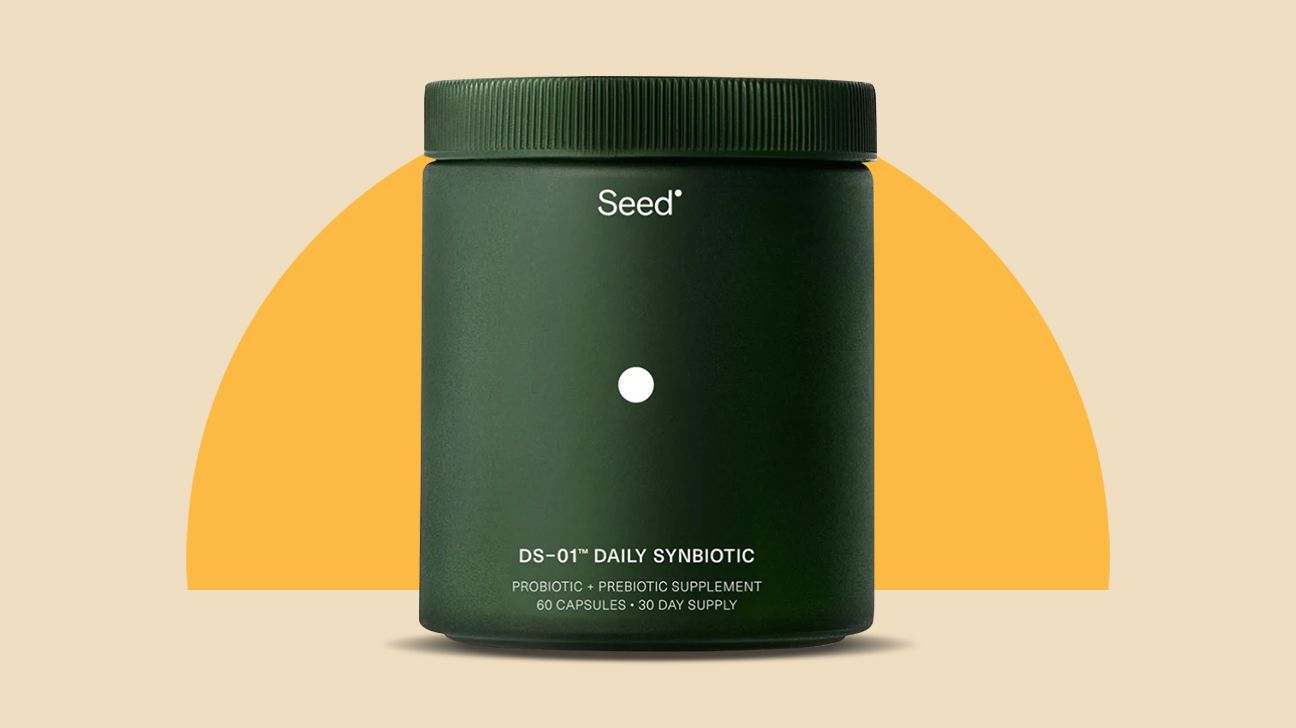Our Seed probiotics review looks in-depth at DS-01 Daily Synbiotic, a high-quality probiotic featuring 24 different strains. Our testers found it alleviated bloating and was easy to use, even when traveling.
Seed is a gut health supplement company that’s quickly growing in popularity.
The company’s flagship product, DS-01 Daily Synbiotic, includes both pre- and probiotics for comprehensive gut health.
Because the supplement is pricier than some other probiotics and requires a subscription, you may be wondering whether Seed DS-01 Daily Synbiotic is worth the cost.
Keep reading for our dietitian’s review of the science behind Seed Daily Synbiotic, as well as our editors’ firsthand experiences trying the supplement.
Disclaimer: Seed provided a 30-day supply of its DS-01 Daily Synbiotic for free. But our opinions and reviews are ours alone.
Our Medical Standards and Insights team has carefully researched and vetted over 11,000 products and services. We fact-check health claims, evaluate ingredients, and look into each brand’s reputation before sharing products and services on Healthline.
To choose the products on this page, we considered all the probiotics that passed our vetting process. Then, we personally tested some of them to narrow down our list even further.
- Price: $49.99 per month, $134.97 for 3 months, or $254.95 for 6 months
- Dose: 2 capsules daily
- Refrigeration: not required
- What makes it different: In addition to providing a unique blend of pre- and probiotics, Seed DS-01 Daily Synbiotic capsules are specially designed to keep probiotic strains intact until they reach the colon for optimal effectiveness.

Founded in 2018 by Ara Katz and Raja Dhir, Seed is a subscription-based probiotic company.
The company offers two products: DS-01 Daily Synbiotic, which is formulated for adults, and PDS-01 Pediatric Daily Supplement, which is formulated for kids and teens ages 3–17 years.
DS-01 Daily Synbiotic contains four unique blends of probiotics with a specific health focus.
Below is a quick look at the blends.
AFU vs. CFU
If you’ve shopped for a probiotic supplement before, you’ve likely seen “CFU count” listed on the bottle. CFU stands for colony forming units and is a measure of the viable and culturable probiotic cells per dose.
Seed DS-01 Daily Synbiotic stands out in that it uses active fluorescent units (AFUs) instead of CFUs.
Digestive Health/Gut Immunity/Gut Barrier Integrity Probiotic Blend
- AFU count: 37.0 billion
- Strains: Bifidobacterium longum SD-BB536-JP, Bifidobacterium breve SD-BR3-IT, Lactiplantibacillus plantarum SD-LP1-IT, Lacticaseibacillus rhamnosus SD-LR6-IT, Lacticaseibacillus rhamnosus HRVD113-US, Bifidobacterium infantis SD-M63-JP, Bifidobacterium lactis SD-BS5-IT, Bifidobacterium lactis HRVD524-US, Lactobacillus crispatus SD-LCR01-IT, Lacticaseibacillus casei HRVD300-US, Bifidobacterium breve HRVD521-US, Bifidobacterium longum HRVD90b-US, Bifidobacterium lactis SD150-BE, Limosilactobacillus fermentum SD-LF8-IT, Lacticaseibacillus rhamnosus SD-GG-BE, Limosilactobacillus reuteri RD830-FR
Dermatological Health Probiotic Blend
- AFU count: 3.30 billion
- Strains: Ligilactobacillus salivarius SD-LS1-IT, Bifidobacterium lactis SD-CECT8145-SP, Bifidobacterium longum SD-CECT7347-SP, Lacticaseibacillus casei SD-CECT9104-SP
Cardiovascular Health Probiotic Blend
- AFU count: 5.25 billion
- Strains: Lactiplantibacillus plantarum SD-LPLDL-UK, Bifidobacterium lactis SD-MB2409-IT
Micronutrient Synthesis Probiotic Blend
- AFU count: 8.05 billion
- Strains: Bifidobacterium adolescentis SD-BA5-IT, Limosilactobacillus reuteri SD-LRE2-IT
The product also contains Indian pomegranate, a prebiotic that Seed claims is suitable for individuals with sensitive digestive tracts and those following a low FODMAP diet.
Seed DS-01 Daily Synbiotic is vegan-friendly, free from major allergens, and suitable for those following a low FODMAP diet due to its nonfermenting prebiotics.
The product is also shelf-stable and comes in an eco-friendly glass container.
Seed’s delivery system, known as ViaCap, is also notable. According to the company, this capsule technology protects probiotic strains from stomach acid, ensuring that the probiotics reach the intestines where they can provide the most benefit.
A
Seed DS-01 Synbiotic undergoes rigorous third-party testing for pesticides, herbicides, allergens, and contaminants to ensure purity and quality. Final products are also tested to confirm potency, which helps make sure that ingredients are present in the listed amounts.
Two clinical trials are currently underway to study the effectiveness of Seed DS-01 Daily Synbiotic for general gut health in adults after a course of antibiotics and for improving symptoms in adults with irritable bowel syndrome (IBS).
Because the studies are in progress, the effectiveness of Seed DS-01 Daily Synbiotic is unknown. However, the product does contain several probiotic strains that have been shown to have benefits for gut, skin, and heart health.
For example,
Perhaps most interesting is the product’s inclusion of probiotics intended to support the
For example,
DS-01 Daily Synbiotic also contains
Finally, Seed DS-01 Daily Synbiotic also includes Indian pomegranate. Pomegranates are rich in polyphenols, which may act similarly to prebiotics. The good bacteria in the gut can break down these polyphenols, potentially using them for energy, similar to how they use prebiotics.
Overall, Seed DS-01 Daily Synbiotic contains several evidence-backed probiotic strains. Still, it’s important to note that some of the reported health benefits of these probiotics are based on test tube studies or older research.
While there’s some evidence to support the benefits of specific strains found in Seed DS-01 Daily Synbiotic, newer human studies are needed to confirm whether taking these probiotics in supplement form translates to meaningful effects on health.
At time of publication, Seed DS-01 Daily Synbiotic costs $49.99 for a 30-day supply. You can save money by purchasing a 3- or 6-month supply.
Here’s a breakdown of the three subscription options:
| Delivery frequency | Number of bottles per delivery | Price | Cost savings |
|---|---|---|---|
| Every month | 1 | $49.99 | — |
| Every 3 months | 3 | $134.97 | 10% |
| Every 6 months | 6 | $254.95 | 15% |
Shipping is free within the United States and costs $10 for international orders.
Customers can manage their subscription through Seed’s website, with options to pause, cancel, or change their subscription as needed.
Pros
- third-party tested for purity and potency
- vegan-friendly
- free of gluten and other major allergens
- shelf-stable
- contains research-backed probiotic strains
- subscription-based refillable glass jar
- includes travel-sized vial
- eco-friendly packaging
- easy to swallow
Cons
- pricier than some other probiotics
- subscription required
- may cause unwanted gastrointestinal (GI) symptoms, especially during the first few days
- may not be appropriate for everyone
- some probiotic strains in Seed lack newer human studies to support their benefits
- relatively large capsule size
Several of our editors tested Seed DS-01 Daily Synbiotic.
Editor Kelle Walsh tried Seed DS-01 for just under 10 days and commented: “Upon receiving my DS-01 Daily Synbiotic 30-day sample from Seed, I was immediately impressed with the care that went into the packaging — all biodegradable — and that the supplements come in a refillable dark glass container, to protect them from light.
“I also liked that a smaller travel-sized vial (also glass) was provided, so you can take your supplements in measured amounts on a trip.” Walsh ultimately discontinued daily use due to other health issues, but felt Seed was worth considering for people who have been recommended to take a pre- and probiotic supplement by a healthcare professional.
Senior Director Rita Mauceri tried Seed DS-01 for 30 days.
The product comes with detailed instructions on how to begin taking DS-01. She commented: “Seed advises you to start with 1 capsule a day for several days, before moving to 2 capsules a day. I followed the directions and had no issues. I did notice after 4-5 days that my bloating disappeared which was great.”
She went on to say, “I typically prefer very small capsules or pills. These were a bit larger (I’d say average capsule size) but I found them very easy to take.”
Like other testers, Mauceri also appreciated the travel-size vial which was included. “I find traveling often makes my gut act up, but Seed’s travel packaging makes it easy to take these on the go, which I recently did on a trip to Italy.”
Seed DS-01 Daily Synbiotic is designed for healthy individuals over the age of 18 who are interested in its potential health benefits.
It may be particularly beneficial for people regularly experiencing digestive symptoms like diarrhea or constipation.
However, this supplement may not be suitable for certain individuals, including:
- Pregnant or breastfeeding people: While probiotics are generally considered safe for pregnant and breastfeeding individuals, the specific effects of the DS-01 formulation on pregnant or breastfeeding individuals have not been extensively studied, so it’s a good idea to run it by your doctor first.
- Immunocompromised people: People with weakened immune systems, either due to medical conditions or treatments, should meet with their doctor first. Probiotics introduce live bacteria into the body, which could pose risks for individuals with a compromised immune system.
Keep in mind that probiotics are not necessary or appropriate for everyone and can lead to unwanted side effects. Additionally, because different probiotic strains have different health effects, you’ll want to consider your reasons for taking a probiotic supplement to ensure that DS-01 is the right fit.
Before taking Seed or another probiotic supplement, it’s important to talk with a trusted healthcare professional for personalized advice.
According to the company, it’s not unusual to experience mild GI side effects during the first few days of taking Seed DS-01 Daily Synbiotic. These side effects may include:
- bloating
- nausea
- changes in stool
- general GI discomfort
To help your body adjust to the supplement, Seed recommends taking just 1 capsule per day for the first 3 days and then increase to the full dose of 2 capsules on day 4.
If you’re interested in trying a synbiotic, there are a growing number of products to choose from, including options from Ritual and mindbodygreen. Here’s a quick look at how they compare:
| Product (price) | Serving size | CFU/AFU count | Number of strains | Overview |
|---|---|---|---|---|
| Seed DS-01 Synbiotic ($49.99) | 2 capsules | 56.3 billion AFUs | 24 | pre- and probiotic formulated to support gut, skin, heart, and immune health |
| mindbodygreen probiotic+ ($80) | 1 capsule | 32 billion CFUs | 4 | probiotic formulated to support healthy bowel movements and reduce gas and bloating |
| Ritual Synbiotic+ ($54) | 1 capsule | 11 billion CFUs | 2 | 3-in-1 blend of prebiotics, probiotics, and a postbiotic designed to support gut and immune health |
Seed DS-01 Daily Synbiotic is third-party tested for purity and potency, though the name of the testing organization isn’t disclosed.
Some users may experience mild digestive discomfort, such as bloating or gas, especially during the initial days of taking Seed probiotics. According to the website, this is normal and goes away as the body adjusts.
That being said, some online reviews mention that these side effects did not go away until stopping the supplement.
While both contain probiotics, Seed and AG1 are quite different. Seed DS-01 Daily Synbiotic only contains pre- and probiotics. In contrast, AG1 is a greens powder that contains more than 75 vitamins, minerals, superfoods, and probiotics.
Seed DS-01 Daily Synbiotic is a high quality probiotic supplement that offers a convenient way to support your overall gut health, though it’s not appropriate for everyone.
In addition to being expensive, Seed DS-01 Daily Synbiotic may cause unwanted side effects and shouldn’t be taken by people who are pregnant, breastfeeding, or immunocompromised.
Because probiotic supplements are not necessary or suitable for everyone, it’s important to talk with a healthcare professional before making any additions to your wellness routine.















